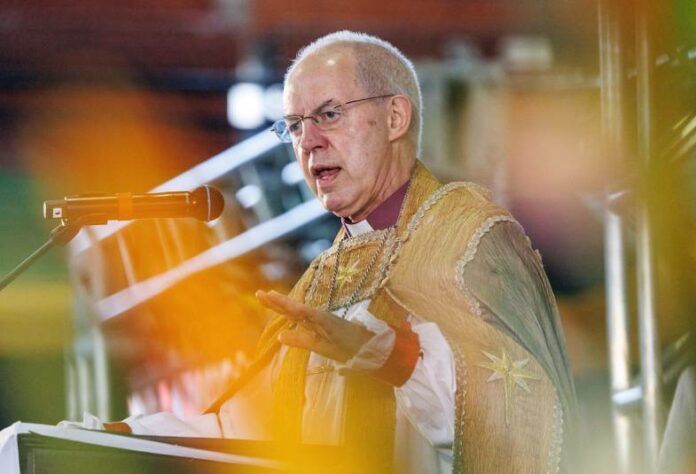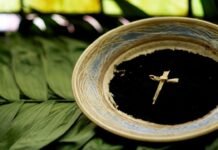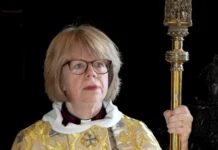Thank you, Archbishop. Thank you for the invitation to preach at this birthday celebration. And at the same time as this, there is another birthday going on in Barbados and we praise God that we are celebrating together before the throne of God.
It’s an enormous privilege to be invited. But it is also, Archbishop, and all of you, an act of grace and forgiveness on your part. We know that parts of the Church of England and even one of the Archbishops – Thomas Secker – in the 18th century, held slaves, owned slaves.
The shepherds, as Ezekiel says, consumed the flock. It is no wonder that the Church of England has suffered judgment for that. For what worse thing could be done. And even for those in the church who did not actively participate in Transatlantic chattel enslavement, the silence of the Church of England was a collusion, an agreement with slavery. The votes of the bishops in Parliament were a support for slavery and their receiving of compensation for freeing the slaves was a profit from slavery.
Today we know that was wrong, a vile and disgusting sin. Yet even today, when the Church of England puts aside a little of its gains, so that the future may be helped to be better than the past, we were in England as a church, and as church leaders, resisted, both publicly and privately. There remains in many hearts resistance to the concept of enslavement as our sin, and to the celebration of ending the idea that a human being can ever be a possession. The church sinned and consumed the sheep.
I cannot speak for the Government of the United Kingdom, but I can speak from my own heart and represent what we say in England now. We are deeply, deeply, deeply sorry. We sinned against your ancestors. I would give anything that it could be reversed, but it cannot.
So what makes for a better future? For when we come to worship God, when we come to serve Jesus Christ, we are all equal. Even those who have sinned terribly. And we are all equal, for to God, all time is now. What we have done, remains in the present both for good and evil. And where there is repentance, we know that by the grace and love of God, as we sang ‘Nothing in my hands I bring, simply to your grace I cling’, there is a burial of sin. But there is not a reversal of history.
The call to love the flock of God remains, and the knowledge of when our predecessors so terribly failed cannot be ignored. We are, each of us, you and I and all of us together, the church around the world, we are forgiven by God for the things we confess because Jesus bore those sins on himself, being God himself. But we are now responsible to God for the action to do right, to repent, to say sorry, must involve reversing direction, going a different way.
We celebrate the past in which the living forgiveness of our Saviour and His ever present love, lead the church into seeking to do right. Too late, but better late than never. The church learned in Ephesus, that church to which Paul wrote in the epistle, it learned of walls broken down, the conversion of people from enemies to one people, holy and united, sharing in the cleansing blood of Jesus Christ. And the church began in the 19th century – just began to change – from loving power, to loving people.
The Good Shepherd of Psalm 23 is at work among us. Conversion changes the whole sense of who we are. It gives us a new identity. In Kensington in Philadelphia in the USA, there is an area in which every kind of human evil flourishes. Drug gangs openly sell, people die on the street in front of you. Caroline and I were there last August. They die from the drugs, from fentanyl, from heroin, from other drugs. Guns are in constant use. And in that darkness, there is only one light and it is the light of Christ shed through the church. Not one church, Your Grace, not one church in human terms, but one church where all Catholic and Protestants work together in love. There I saw the church. The church of many denominations but one Lord, in love for those suffering. The guns can be handed in without anyone asking questions. Outside the Christian community there, there are big bins, and the people who want to get rid of their guns put the guns in the bin.
Our friend is one of the leaders there. He’s been there for 25 years. He’s watched that part of town burn in a great fire. He’s helped to build it together. He brings the churches together – Franciscan Sisters, who minister to those wounded and hurt by the drugs. Protestant Mennonite communities who have a small hospital. And in his community, they have a forge where they can melt guns down or cut them up. I have an example, he gave it to me. It’s not a gun anymore. It’s a cross. It’s about this big and it used to be an automatic rifle. But it has a new identity. Actually normally, they make plough shares and spades and trowels and forks, useful things for everyday use. They turn guns into household implements. But he gave me three of these crosses made from gun metal from the same rifle and cheerfully – rather overestimating the importance of the Archbishop of Canterbury, which is not always the case – he said, ‘I’ll give you one, but you must give one to the Secretary General of United Nations and one to the Pope.’ You know I have breakfast with them every morning, it’s easy. Actually, by the grace of God, I did manage to do it within four weeks. So that was a miracle.
That is conversion. That is what God does with our sin-filled, sinful, sin-darkened church. That is what God does. And that is part of the story of the Diocese today. Yesterday, it was savaged by its shepherds. Today it is a Diocese that suffers from the consequence of the past when it was the Church of slave owners. Suffers from the agonies of the present when it must minister to those touched by hurricanes, by gangs, by drugs themselves, by guns. Suffers from all the terrible consequences of climate change as well as hurricanes.
The church suffers, says Jesus, when it seeks to educate, not fashionably, but faithfully, to develop in areas of need. It suffers in a world without God, where every person needs to hear afresh the news of Jesus Christ who converts our hearts, who is behind us, behind each of us, at our door, arms open to embrace us, if we will but turn to him who is here today by His Spirit.
The church suffers but God rules, and Paul says to the Ephesians this has an impact. We need to remember where Ephesus was. It’s in ruins today, and miles from the sea, though it was a great port. The sea’s gone further back. But it was the centre of a great temple to a pagan goddess called Diana. The worship was carried out by temple sex workers, and the worship of Diana was jealously protected by those who made her silver images or served the temple. The Christians were a small and hated and despised group. They were much weaker than we are today, than the Diocese of Jamaica is today. Perhaps a few dozen. Yet they are reminded of what God has done, for they are united, this church to which he writes. They had come from Jews and Greeks. They had come from every background on Earth. They were slaves and they were slave owners. And yet they loved one another because they were loved by God.
The miracle of the church is that the unlike-minded, the historic enemies, love one another, enough to die for one another. And that is why in the first three centuries of Christianity, the church, without an army, without drawing a sword, conquered the Roman Empire and set the patterns of good and evil by living out good before an evil world. That is the vision we are to hold to. And when you said, Archbishop, at the beginning of this service, that you were united, my heart was warmed by your gracious words. Because to be united is to be closer to Christ. We do not unite against people, we unite to serve the world.
So I say to you today on your 200th birthday, don’t be surprised by suffering. Know that God is the one who overcomes. We have hope amid the sufferings and failures of the church. Its future does not depend on our successful decisions, on our being good, but on God’s accomplished, already achieved, overcoming of evil. Let the good news of Christ grip you. For when it does, the Holy Spirit fills us with joy. We can say confidently I am loved by God. In his eyes I am a person called love, precious and with a purpose. God calls each person who seeks salvation into service. God brings us to love one another. And we come to the Gospel reading and what is Jesus doing? He is overwhelmed.
The last two days – this is not really a criticism – have been just a touch tiring, not least because my body clock is 5 hours ahead of where you lot are. So every time I went out to dinner, my body was saying ‘What are you doing having dinner at two o’clock in the morning?’ But for Christ it was a million times more. The people flocked to him, not to take a selfie, but to be healed. By the grace of God, they were not invented at that point. Not to take a selfie, but to be healed. And without question he reached out to them. And he said to his disciples, ‘this is a bit busy’ – that’s the Welby translation – ‘this is a bit busy, let’s go somewhere where no one is.’ And this is one of the moments where you see that Jesus sometimes does things that don’t work because they get into a boat and cross the Sea of Galilee, get out of the boat in a deserted place. And by the way, the disciples have forgotten to bring any food, but that’s another story. They get out of the boat, and lo and behold everyone has rushed round the ends of the lake, and there they are another crowd – wanting healing. And God in Jesus does not hesitate. His love expands. I’m sure he was tired – he was human. I’m sure he was tired, I’m sure he was weary. I’m sure something inside him said ‘Uh! Again?’ And then he said Father, to his father in God, ‘Father, you are here, and you are here to heal, and they are sheep without a shepherd.’ But he takes the disciples away to spend time with him. Even the little time in the boat they spent with him.
The needs come and meet us, the hurricane blows and the church, whatever its plans, must drop its plans and reach out to the people. And it was done. You have witnessed to Christ, and you continue to do so. And God smiles on this Diocese. God sees it in his heart, rejoices, and he says to the angels – ‘They are my folks’. He probably says it in Jamaican. I don’t speak Jamaican but I’m sure God does. It sounds a friendlier language than English. So that is the third thing. First of all, suffering you have endured, and it will come again. Secondly, find the joy of knowing you are loved by Christ. And thirdly how do you do that? Take time to be with God.
And when the needs of the world rush upon you and upon the whole church, even as in a hurricane at 120 miles an hour of wind, when that happens, what do you do? You do what you can, not what you can’t. I think the toughest part of ministry and being a church is not the things you do, but the things you don’t have the resources to do. And then we beat ourselves up and we feel guilty. A friend of mine in eastern Congo, who died during Covid, a very close friend, a bishop, one of the finest bishops in the Anglican Communion, gave his life in service during Covid and during the Ebola epidemic up with the militias in the northern part of his Diocese. He said to me, when I said in a refugee camp of 25,000 people, how do you deal with this? He said, ‘I do what God gives me the resources to do, and the rest is his problem.’
Dear Diocese of Jamaica and the Cayman Islands, beloved province of the West Indies, whom I love, but not a millionth as much as Go, I say to you – do what you can, grow close to Jesus Christ, spend time in prayer and with scripture, and do what you can with the resources he gives you, and say to him, ‘Lord, that’s it. Unless you give us more, we cannot do more.’
When you see young people who need to be drawn to Christ, love them. Use the resources you have to draw them towards faith. Treat them with respect and love when you see the poor and the weak and the disabled and the hungry. When you see the broken houses, you cannot do everything. But the one thing we can do is let Christ embrace them through us, even when we have to say, ‘Nothing in my hands I bring, simply to His cross I cling.’
Amen.



